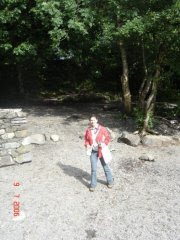Now that image capturing devices are so prevalent there are certain ethical issues, namely privacy. Basically, in public places you can be photographed without consent and your picture used by whoever, for whatever. According to Wikipedia, "in the United States, anything visible ("in plain view") from a public area can be legally photographed. This includes buildings and facilities, people, signage, notices and images. It is not uncommon for security personnel to use intimidation or other tactics to attempt to stop the photographer from photographing their facilities (trying to prevent, e.g., industrial espionage); however, there is no legal precedent to prevent the photographer so long as the image being photographed is in plain view from a public area."
Retrieved from http://en.wikipedia.org/wiki/Street_photography on March 9th 2008
Sunday, March 9, 2008
How do we store, transfer and manipulate digital images
Today we store digital images on cameras, mobile phones, hand held computers (blackberries, blueberries) and video cameras. We can transfer images via email, blogs and social networking sites and we manipulate the images using all manner of photoshop software.
Thursday, March 6, 2008
Digital camera use and application
"A new technology is rarely superior to an old one in every feature" Mmmm interesting. I essentially agree with this statement. Thinking about digital cameras in particular, they are great in many ways. You can view your image and re-take the photo if the image is fuzzy, wonky, full of friends with their eyes closed, or just think that you could do better. Which we all seem to because no-one takes one photo anymore, we take two, three or four, to then delete one, two or three. Technically film camera's produce photo's of a better quality and are more resistant to those of us who don't seem to be able to hold the camera still whilst pressing the button.
Digital camera's are expensive and full of complicated chips and techno-stuff. They're great but require a bit of careful handling. There is plenty to worry over, "will I scratch it, jolt it or accidentally submerge it whilst falling out of a kayak?" We can now download images onto our computer and view them in minutes, we can each send them across the planet in seconds. All good eh? Except I quite liked the excitement of sending off my camera film to a mysterious address and then waiting for my photos to appear on my doorstep. Looking through the photos would take me right back in time and I'd smile at the memories, despite the fact that my photos were usually not brilliant. Nowadays you need the techno-know-how and all the equipment to produce a physical image. Gone are the days of gathering round the photo album, now we have to set up the computer to view our memories. It's just not quite as accessible.
All in all, the old film camera did have something to offer and whilst digital cameras are great I don't agree that they are superior, just different.
Digital camera's are expensive and full of complicated chips and techno-stuff. They're great but require a bit of careful handling. There is plenty to worry over, "will I scratch it, jolt it or accidentally submerge it whilst falling out of a kayak?" We can now download images onto our computer and view them in minutes, we can each send them across the planet in seconds. All good eh? Except I quite liked the excitement of sending off my camera film to a mysterious address and then waiting for my photos to appear on my doorstep. Looking through the photos would take me right back in time and I'd smile at the memories, despite the fact that my photos were usually not brilliant. Nowadays you need the techno-know-how and all the equipment to produce a physical image. Gone are the days of gathering round the photo album, now we have to set up the computer to view our memories. It's just not quite as accessible.
All in all, the old film camera did have something to offer and whilst digital cameras are great I don't agree that they are superior, just different.
Subscribe to:
Comments (Atom)

